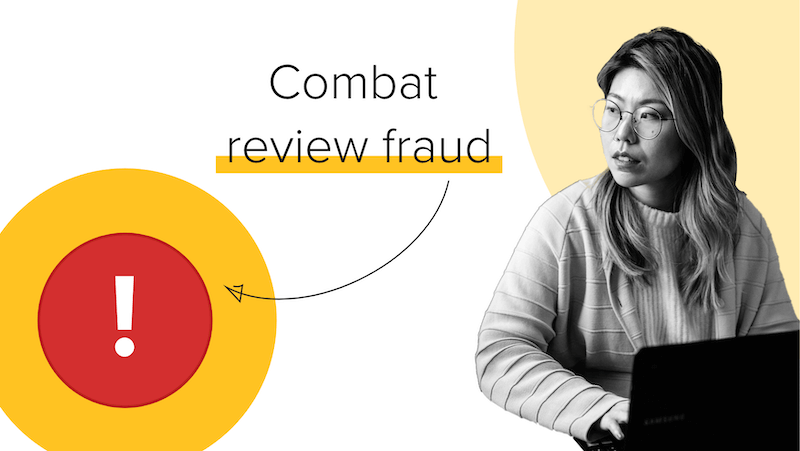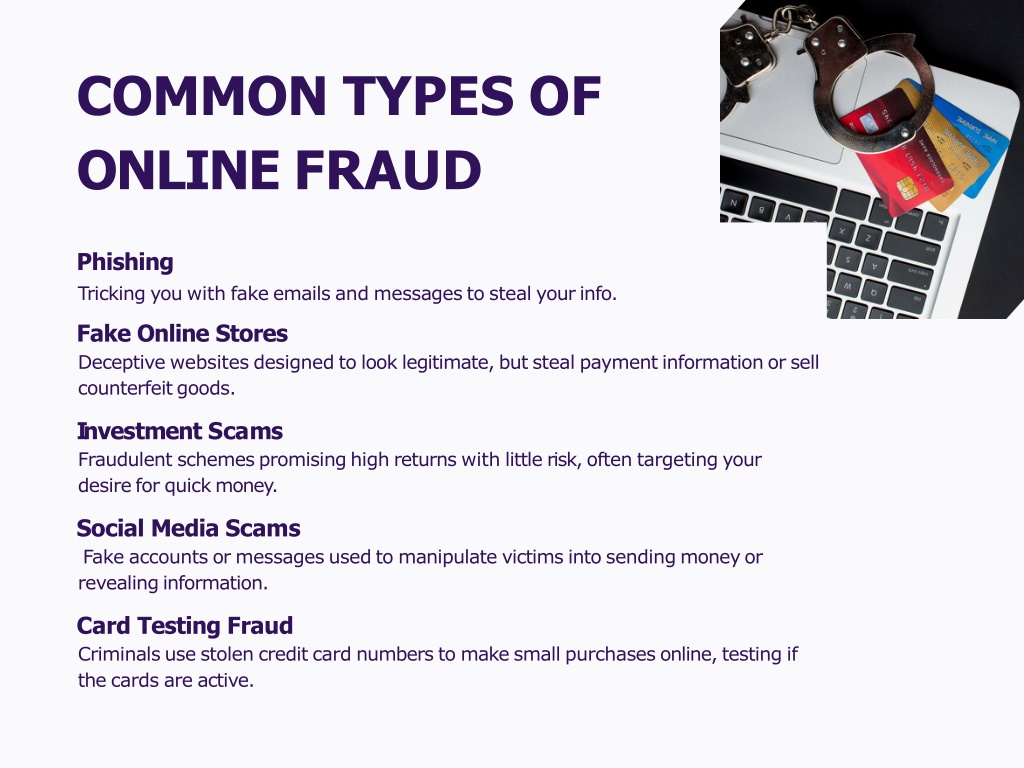
|
IN BRIEF
|
In today’s digital age, the internet has opened up myriad opportunities for communication, commerce, and information sharing. However, it has also given rise to various online scams that prey on unsuspecting users. These scams take numerous forms, employing tactics designed to deceive individuals into sharing personal information or financial resources. Understanding the different types of online scams is crucial for individuals and organizations to protect themselves against potential threats and maintain a secure online presence.
Online scams are deceptive practices designed to exploit individuals and organizations for financial gain. They come in various forms, each employing different tactics to lure people into providing personal information or money. Understanding the various types of scams can help individuals recognize and protect themselves from falling victim to these malicious activities.
Types of Online Scams
Among the most prevalent types of online scams are phishing attempts, where scammers impersonate legitimate entities to steal sensitive data like usernames and passwords. Another common type is the advance-fee scam, where victims are promised large sums of money in return for an upfront payment. There are also online auction scams, that involve fraudulent listings on auction websites. Cyber attackers may also deploy ransomware, which encrypts a victim’s files and demands payment for their release.
Advantages
A keen awareness of different types of online scams can empower individuals to take proactive measures to safeguard their data. By educating themselves about these scams, users are less likely to become victims, contributing to a more secure online community. Furthermore, identifying common tactics used in scams can help improve overall cybersecurity practices, such as utilizing two-factor authentication and being cautious with personal information online.
Inconvenients
Despite the advantages of being informed about online scams, there are significant inconveniences that can arise. The prevalence of these scams can lead to a climate of fear and distrust among internet users. Victims often experience emotional distress and financial loss, which can have long-lasting effects. Additionally, the resources and time spent on recovering from a scam can be overwhelming, diverting attention from legitimate online activities. For a more detailed overview, visit this resource.
Online scams have become increasingly prevalent in today’s digital landscape, posing significant risks to both individuals and organizations. There are various types of scams, each designed to exploit unsuspecting victims for financial gain or sensitive information. Understanding these scams is essential for protecting your digital assets and ensuring a safer online experience. In this article, we will explore the most common types of online scams and provide insights into how they operate.
Phishing Scams
Phishing scams are designed to trick individuals into providing personal information, such as passwords or credit card numbers, by disguising as trustworthy entities. This form of scam often occurs through emails, messages, or even fake websites that closely resemble legitimate ones. Victims may receive messages claiming to be from their bank or a well-known company, prompting them to click a link and enter sensitive data. It’s crucial to verify the source before responding to any requests for personal information.
Investment Scams
Another prevalent type of online scam is investment scams. These scams typically promise high returns with minimal risk, luring victims into investing in fraudulent schemes or fake companies. Scammers may use persuasive tactics, including expert testimonials and fake financial reports, to build trust. It’s essential to conduct thorough research before investing and to remain skeptical of offers that seem too good to be true.
Online Auction Scams
Online auction scams often occur on popular buying and selling platforms where fraudsters post fake listings for high-demand items at attractive prices. Once a victim expresses interest, the scammer may request payment outside of the platform, leaving the victim with little recourse if the item never arrives. Always use secure payment methods and communicate through official channels when participating in online auctions.
Tech Support Scams
Tech support scams are another alarming form of online deceit. Scammers usually impersonate technical support agents, claiming that a victim’s computer is infected or compromised. They may request remote access or payment for unnecessary services or software. If you receive unsolicited calls claiming to be tech support, do not engage with them and report the incident.
Romance Scams
Romance scams target individuals looking for love online. Scammers create fake profiles on dating websites or social media platforms, building emotional connections with victims before asking for money or gifts. These scams can be particularly devastating, as they exploit the victim’s emotions. Always be cautious of anyone who asks for money early in an online relationship, and consider meeting in person before proceeding further.
To learn more about online scams and how they work, you can visit this website.

Understanding Online Scams
Online scams have become increasingly prevalent in today’s digital landscape. Scammers employ various strategies to deceive individuals and organizations, leading to financial loss and compromised personal information. Awareness of these scams is essential for protection against potential threats. This article explores the different types of online scams, their mechanisms, and how to safeguard oneself from falling victim.
Common Types of Online Scams
Phishing Scams
Phishing scams are one of the most widely recognized methods employed by cybercriminals. These scams typically involve fraudulent emails or messages that appear to come from reputable sources, tricking recipients into providing sensitive information such as passwords or credit card numbers. Always verify the sender’s address and avoid clicking on suspicious links.
Online Shopping Scams
As e-commerce flourishes, so do online shopping scams. These scams often involve fake websites that mimic legitimate retailers, enticing consumers with incredible deals. When a customer makes a purchase, they may either receive subpar products or nothing at all. It’s vital to shop only on trusted sites and look for secure payment options.
Investment Scams
Investment scams promise high returns with minimal risk and often target individuals seeking to grow their wealth. These scams may take the form of Ponzi schemes or fraudulent investment opportunities. Potential investors should conduct thorough research and be cautious of offers that seem too good to be true.
Tech Support Scams
Tech support scams involve individuals posing as representatives from well-known software companies. They often claim that a user’s device is infected with a virus or requires immediate attention. Once contact is established, scammers may ask for personal information or fees for unnecessary services. Always contact the company directly via official channels if you suspect a security issue.
Romance Scams
Romance scams prey on individuals seeking relationships online. Scammers establish emotional connections and may eventually ask for money for various reasons, exploiting their victims’ feelings. Be cautious when communicating with someone you haven’t met in person and verify their identity before sending any money.
Staying Safe Online
To protect yourself from online scams, it is crucial to remain vigilant and informed. Regularly update your passwords, enable two-factor authentication, and be wary of unsolicited communications. For additional guidance on the types of scams and protective measures, visit this resource.
Types of Online Scams
| Type of Scam | Description |
| Email Phishing | Fraudulent emails designed to trick users into revealing personal information. |
| Online Auction Scams | Frauds related to bidding on items that may not exist or be misrepresented. |
| Investment Scams | Offers promising high returns with little to no risk, often misleading. |
| Tech Support Scams | Impersonation of technical support to convince users to pay for fake services. |
| Romance Scams | Emotional manipulation to solicit money under the guise of a romantic relationship. |
| Fake Charities | Scams that exploit charitable giving, often during crises or disasters. |
| Ransomware | Malicious software that locks users out of their data until a ransom is paid. |

Understanding the Different Types of Online Scams
Online scams are deceptive tactics used by fraudsters to exploit unsuspecting individuals and organizations on the internet. These scams can take many forms, with the primary aim of stealing personal information or financial resources.
One prevalent type of online scam is phishing, where attackers send fraudulent emails that appear to be from reputable companies. These emails often contain urgent requests for sensitive information or direct the recipient to fake websites designed to harvest login credentials. Phishing is effective because it preys on the recipients’ trust and urgency.
Another common scam is the advance-fee scam, where victims are promised large sums of money in exchange for a small upfront payment. It typically involves a convincing narrative, such as an inheritance or a business deal, which leads the victim to believe that they are on the verge of receiving significant financial gain, if only they pay a nominal fee first.
Online auction or classified scams are also widespread. In these cases, scam artists list products at enticingly low prices but never deliver the item after receiving payment. They often use fake identities and assume the role of a credible seller to gain the buyer’s trust. Online auction scams can lead to significant financial losses for victims.
Additionally, investment scams have gained traction, particularly with the rise of cryptocurrencies. These scams often promote unrealistically high returns on investments and can appear highly professional. Unsuspecting investors find themselves duped as their funds vanish with no trace, leaving them with significant financial losses.
In recent years, technical support scams have also emerged as a serious threat. Victims receive unsolicited phone calls or pop-up messages claiming to be from tech support teams of well-known companies. These scammers trick individuals into providing remote access to their computers or paying for unnecessary services.
Recognizing these various types of online scams is vital for ensuring online safety. Awareness helps individuals and businesses safeguard their sensitive information and financial assets in an increasingly dangerous digital landscape.
Understanding Online Scams
Online scams are deceitful schemes designed to trick individuals into revealing personal information or making financial transactions under false pretenses. With the rise of technology and the internet, these scams have become increasingly sophisticated and prevalent. This article will explore the various types of online scams, their mechanics, and how to protect yourself from becoming a victim.
Phishing Scams
One of the most widespread types of online scams, phishing, involves fraudsters posing as trustworthy entities to lure victims into providing sensitive information. This is typically executed through emails, social media messages, or fake websites that imitate legitimate platforms.
Phishing attacks often create a sense of urgency or fear, urging individuals to act quickly. It is essential to scrutinize emails for suspicious links and verify the authenticity of requests for personal details.
Spear Phishing
A variant of phishing, spear phishing targets specific individuals or organizations. Scammers research their victims to craft personalized messages that appear credible. The greater personalization increases the chances of success in deceiving the victim.
Be wary of unsolicited emails that contain personalized information and ensure to verify the sender’s identity before responding.
Online Shopping Scams
The convenience of online shopping has given rise to various scams related to fraudulent e-commerce sites. Scammers create fake websites that mimic legitimate retailers to steal customers’ payment information or deliver inferior products.
To avoid falling victim to online shopping scams, always look for reviews and ratings for the website, ensure that it uses secure payment methods, and check for contact information.
Advance Fee Scams
Advance fee scams promise substantial returns for a small upfront payment. A notorious example is the “Nigerian prince” email scam, where individuals are asked to pay a fee to access a supposed fortune.
It’s vital to remain skeptical of any offers that seem too good to be true, and never pay upfront costs for promised financial rewards.
Investment Scams
With the rise of cryptocurrency and various investment opportunities, there has been an increase in investment scams. Scammers use persuasive tactics, creating the illusion of a legitimate investment requiring immediate action.
Researching investment opportunities thoroughly and consulting with financial advisors can help individuals avoid these fraudulent schemes.
Pyramid and Ponzi Schemes
Pyramid and Ponzi schemes promise high returns with little risk but depend on continually recruiting new participants to profit. Eventually, these schemes collapse when the flow of new investors ceases, resulting in significant losses for those involved.
Understanding the structure of a legitimate business opportunity is crucial before engaging in any investment, especially those that require recruiting others.
Romance Scams
Romance scams exploit emotional connections, often targeting individuals seeking companionship online. Scammers create fake profiles on dating sites and social media platforms to build trust before asking for money for various fabricated emergencies.
If someone you’ve met online starts asking for money, it’s advisable to remain cautious and consider reporting their profile to the platform.
Tech Support Scams
Tech support scams involve fraudsters posing as technical support representatives of reputable companies. They contact victims via phone or pop-up messages, claiming that their system is infected or vulnerable.
Never provide remote access to your computer or disclose personal information unless you have verified the identity of the caller. Established companies typically do not initiate contact for issues regarding your device.

Understanding the Various Types of Online Scams
Online scams have become increasingly sophisticated, targeting unsuspecting individuals and businesses alike. These scams can take many forms, but they all share a common goal: to deceive victims into providing sensitive information or money. Phishing is one of the most prevalent types of online scams, wherein scammers send fraudulent emails or messages that appear to come from legitimate sources. By enticing victims to click on malicious links or provide personal details, they can gain access to confidential information.
Another common type of online scam is the advance-fee fraud, where individuals are promised significant financial rewards in exchange for a small upfront payment. This scenario often involves fake lottery winnings, inheritance claims, or investment opportunities that are too good to be true. Once the victim pays the initial fee, the scammer typically disappears, leaving the victim empty-handed.
Additionally, online shopping scams have surged in popularity, particularly during holiday seasons. These scams can manifest as counterfeit websites or fake listings on legitimate platforms, leading consumers to purchase non-existent or substandard products. Victims may find themselves without recourse as their personal information may also be compromised in the process.
Lastly, the rise of social media has also given birth to several scams, including romance scams. Scammers create fake profiles to build emotional connections, eventually persuading their victims to send money under false pretenses. These tactics exploit the psychological vulnerabilities of individuals seeking companionship, making them particularly insidious.
As the digital landscape continues to evolve, awareness of these various online scams is crucial. Recognizing the signs and understanding how different scams operate can empower individuals to protect themselves and their assets more effectively.
